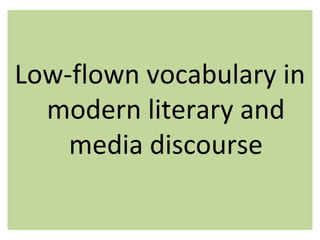Low-flown vocabulary in Modern English
- 1. Low-flown vocabulary in modern literary and media discourse
- 2. COLLOQUIAL WORDS - literary colloquial - familiar colloquial - low colloquial
- 3. 3 subgroups a) change of their phonetic or morphological form; b) change of both their form and lexicostylistic meaning; c) words which resulted from the change of their lexical and/or lexico-stylistic meaning.
- 4. The 1st Subgroup: a) clipping (shortening): caff ŌĆō caffeteria; b) contamination of a word combination: kinna ŌĆō kind of; c) contamination of grammatical forms: I'd go, there's.
- 5. The 2nd Subgroup a) the change of the grammatical form which brings the change of the lexicostylistic meaning: a handful ŌĆō a person causing a lot of trouble
- 6. b) The chqnge of word-building pattern - affixation: oldie, tenner; - compounding: backroom boy, clip-joint; - conversion: to bag, teach-in; - telescopy: flush, fruice; - shortening and affixation: Archie; -compounding and affixation: strap-hanger.
- 9. Examples of Internet Jargon BTW - By the way CYA - See you around FAQ - Frequently asked questions LOL - Laugh out loud TTYL - Talk to you later
- 10. Vulgarisms are the words which are not generally used in public. However, they can be found in modern literature nowadays
- 11. Dialectal words are used to intensify the emotive and expressive colouring of speech ŌĆśud ŌĆō would, ŌĆśim ŌĆō him, ŌĆśud ŌĆō would, ŌĆśim ŌĆō him, ŌĆśaseen ŌĆō have seen, ŌĆśaseen ŌĆō have seen, canna ŌĆō cannot, canna ŌĆō cannot, dinna ŌĆō donŌĆÖt dinna ŌĆō donŌĆÖt
- 12. Conversational words of all kinds are widely used for stylistic purposes: - everyday speech newspaper language poetry fiction












